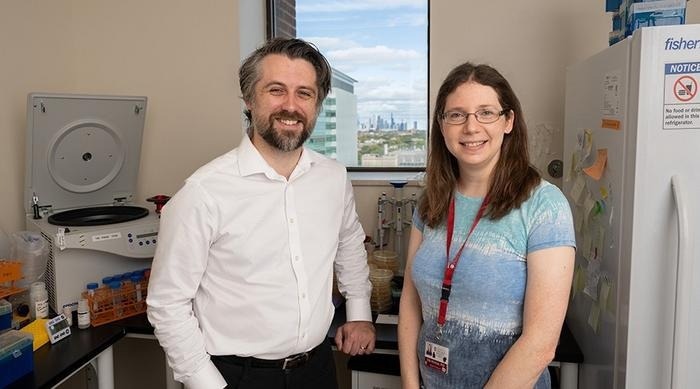Researchers have developed a novel strategy to combat drug-resistant bacterial infections. In this method, they employ groups of bacteriophages, which are viruses that naturally target bacteria. Researchers at the University of Chicago and UChicago Medicine have demonstrated that a combination of these phages is effective in treating antibiotic-resistant Klebsiella pneumoniae infections in mice.
 Researchers at the University of Chicago Pritzker School of Molecular Engineering (PME) and UChicago Medicine, including Asst. Prof. Mark Mimee (left) and research specialist Ella Rotman, have shown that a mixture of collections of bacteriophages can successfully treat antibiotic-resistant infections in mice. Image Credit: UChicago Pritzker School of Molecular Engineering/Jason Smit
Researchers at the University of Chicago Pritzker School of Molecular Engineering (PME) and UChicago Medicine, including Asst. Prof. Mark Mimee (left) and research specialist Ella Rotman, have shown that a mixture of collections of bacteriophages can successfully treat antibiotic-resistant infections in mice. Image Credit: UChicago Pritzker School of Molecular Engineering/Jason Smit
The team's research also demonstrated the complexity of the interactions between phages and bacteria, as some viruses that were thought to be most effective in isolated culture dishes did not always function in animals.
Furthermore, both bacteria and phages can change over time. In certain situations, phages have evolved to become more effective in killing bacteria, whereas in other situations, Klebsiella has developed resistance to the phages.
We still think phages are an incredibly promising approach to treating drug-resistant bacteria such as Klebsiella. But phages are like a living, constantly changing antibiotic which gives them a lot of complexity.”
Mark Mimee, Assistant Professor and Study Senior Author, Department of Molecular Engineering, University of Chicago
The study was published in the journal Cell Host & Microbe.
Klebsiella pneumoniae is a common bacteria that rarely causes problems in people's intestines. However, more serious infections can result when the germs get into other parts of the body, like the urinary system, lungs, bloodstream, or open wounds. Hospital environments are popular places for K. pneumoniae to spread, and drug-resistant strains are now prevalent.
In my clinic, I see patients with recurrent urinary tract infections caused by Klebsiella. Often these bacterial strains develop resistance to oral antibiotics, leaving patients with fewer options to clear the infection. We urgently need new ways of treating these bacteria.”
Sandra Valaitis, MD, Urogynecologist and Study Co-Author, University of Chicago
For almost a century, phages have been recognized as bacteria's natural enemies and investigated for possible medicinal uses. Nevertheless, it has been challenging to forecast these matches because phages are often highly selective for a single species of bacterium.
Scientist Ella Rotman of the Mimee Lab conducted the latest study. She screened wastewater to select phages that could effectively kill 27 different strains of Klebsiella, including 14 recently discovered from patients at the University of Chicago.
The researchers determined which genetic characteristics of the bacteria rendered them more vulnerable to being destroyed or weakened by each of the many dozen phages that were shown to be capable of killing at least some strains of Klebsiella.
Based on that analysis, Rotman and her colleagues created a combination of five phages, each of which targeted a distinct component of the bacteria. This phage cocktail increased the likelihood that immune system-attacking Klebsiella bacteria would be attacked and, in some situations, increased susceptibility to antibiotic treatment in mice and culture dishes. In other instances, though, the treatment increased the bacteria's antibiotic resistance.
It is one of those things where biology often does not work the way you want it to, but it gives us an opportunity to study the detailed dynamics between the phages and the bacteria.”
Mark Mimee, Assistant Professor and Study Senior Author, Department of Molecular Engineering, University of Chicago
The scientists introduced a variety of isolated Klebsiella bacteria into the phage mixture and allowed the phage to evolve. This enhanced the cocktail's capacity to eradicate Klebsiella. The combination significantly reduced or eliminated Klebsiella in mice. In the intestines of mice, the researchers saw co-evolution of the bacteria and phage, with the phage evolving to better infect the modified bacterium and the Klebsiella evolving to elude phage attack.
To learn more about how various phage and bacteria combinations interact with one another and how the presence of other phages and bacteria that are naturally occurring in the human body influences that, Mimee's lab group is continuing its tests.
Simultaneously, they are requesting FDA approval for minor clinical research in which they would test the phage mixture on patients suffering from UTIs in cooperation with Valaitis.
“This research is a positive step forward in trying to sort out the complexities of phages and move them closer to the clinic,” said Mimee.
Source:
Journal reference:
Rotman, E., et al. (2024) Rapid design of bacteriophage cocktails to suppress the burden and virulence of gut-resident carbapenem-resistant Klebsiella pneumoniae. Cell Host & Microbe. doi.org/10.1016/j.chom.2024.09.004.